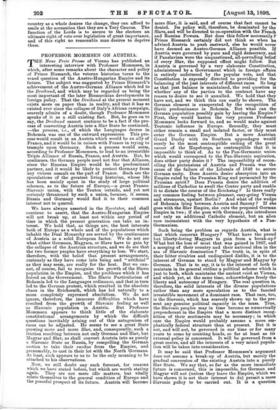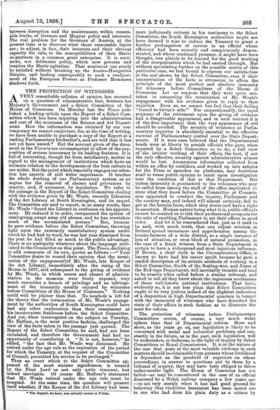PROFESSOR NOMMEN ON AUSTRIA. T HE Neue Freie Freese of Vienna
has published an interesting interview with Professor Mommsen, in which, after some remarks about the character and policy of Prince Bismarck, the veteran historian turns to the vexed question of the Austro-Hungarian Empire and its future. The subject was suggested by Prince Bismarck's achievement of the Austro-German Alliance which led to the Dreibund, and which may be regarded as being the most important of the later Bismarckian developments in foreign policy. That the Dreibund at the present moment exists more on paper than in reality, and that it has so existed ever since the collapse of Italy's African campaign, scarcely admits of a doubt, though Professor Mommsen speaks of it as a still existing fact. But, he goes on to say, the Dreibund cannot continue to be a fact if the pro- cess of converting Austria into a Slav State be continued, —the process, i.e., of which the Languages decree in Bohemia was one of the outward expressions. This pro- cess would result in an Austria which would be an ally of France, and it would be in unison with France in trying to trample upon Germany. Such a process would seem, according to Professor Mommsen, to lead to an irresistible Triple Alliance of Russia, France, and Austria. But, he continues, the German people need not fear that Alliance, since the Russian Empire would be the predominant partner, and it would be likely to protect Germany from any vicious assault on the part of France. Such are the speculations of the greatest living historian, whose life has been mainly spent in the study of large political schemes, as to the future of Europe,—a great Franco- Slavonic union, with the Teuton outside, and yet not seriously threatened by such a union, because, it seems, Russia and Germany would find it to their common interest not to quarrel.
We have always asserted in the Spectator, and shall continue to assert, that the Austro-Hungarian Empire will not break up, at least not within any period of time in which the present generation can take an in- terest. We hold that, as things are, the best interests both of Europe as a whole and of the populations which inhabit the Dual Monarchy are served by the continuance of Austria as a solid European factor. We do not see what either Germans, Magyars, or Slays have to gain by the collapse of the Austrian structure, and we do see that the two former peoples have everything to lose. We start, therefore, with the belief that present arrangements, curiously as they have come into being and " artificial" as they may seem, are really for the best. But we can- not, of course, fail to recognise the growth of the Slavic population in the Empire, and the problems which it has forced on the Government. The Slavic Particularism of Bohemia led to the Languages ordinance, and that in turn led to the German protest, which resulted in the absolute chaos in the Reichsrath, which has led naturally to a more completely expressed absolutism. We do not ignore, therefore, the immense difficulties which have resulted from the growth of Slavonic feeling as well as Slavonic population in Austria. But Professor Mommsen appears to think little of the elaborate constitutional arrangements by which the difficult questions inevitably arising out of this antagonism of races can be adjusted. He seems to see a great State growing more and more Slav, and, consequently, such a friction resulting between not only German and Slav, but Magyar and Slav, as shall convert Austria into as purely a Slavonic State as Russia, by compelling the German section to take their exodus from the Empire, and presumably, to cast in their lot with the North Germans. At least, such appears to us to be the only meaning to be attached to his observations.
Now, we still doubt any such forecast, for reasons which we have stated before, but which are worth stating again. They are not mere idle matters, but vitally relate themselves to the general condition of Europe and the peaceful prospect of its future. Austria will become more Slav, it is said, and of course that fact cannot be denied. Its policy will, therefore, be dominated by the Slays, and will be directed to co-operation with the French and Russian Powers. But does this follow necessarily ? Prince Bismarck certainly did not think so when he advised Austria to push eastward, else he would never have deemed an Austro-German Alliance possible. If Austria were governed by pure and rigid democracy, and if Panslavism were the unquestioned, all-pervading belief of every Slav, the supposed effect might follow. But Austria is governed by a very elaborate Constitution, administered by a Government which in foreign affairs is entirely unfettered by the popular vote, and that Constitution is expressly directed to providing for the balancing of the just interests of different races. So long as that just balance is maintained, the real question is whether any of the parties to the contract have any reason to desire to see it annulled. We hold. that they have not, and we think this can easily be shown. The German element is exasperated by the recognition of Slavic predominance in Bohemia. But what can the German population possibly gain by leaving the Empire ? First, they would hasten the very process Professor Mommsen looks forward to, and so would make against Teutonic influence in Europe. Secondly, they must either remain a small and isolated factor, or they must enter the German Empire. But a mere Austrian Grand Duchy with its Southern appendages would surely be the most contemptible ending of the great career of the Hapsburgs, so contemptible that it is impossible to think of. As to the Pan-Germanic union which would correspond to the Pan-Slavonic aspiration, does either party desire it ? The impossibility of recon- ciling the pretensions of Austria and Prussia was the cause of the failure of the Liberals of 1848 to secure German unity. Does Austria desire absorption into an Empire ruled by the Prussian King and permeated by the Prussian spirit ? Does Prussia desire the addition of millions of Catholics to swell the Centre party and enable it to dictate the course of the Reichstag ? Is there really any common feeling between pleasant, easy-going Vienna and strenuous, upstart Berlin ? And what of the wedge of Bohemia lying between Austria and Saxony ? If she goes with the Slav Empire, she cuts the proposed German Empire in two ; if she goes with Germany, she introduces not only an additional Catholic element, but an alien race inconsistent with the very hypothesis of a Pan- Germanism.
Such being the problem as regards Austria, what is that which concerns Hungary ? What have the proud but liberty-loving Magyars to gain from a break-up ? What but the loss of most that was gained in 1867, and a merging of their country and their national idea in the sea of Slavonic domination ? The truth is, in spite of their bitter rivalries and undisguised dislike, it is to the interest of German to stand by Magyar and Magyar by German. That is to say, it is to the interest of both to maintain in its general outline a political scheme which is just to both, which maintains the ancient reich at Vienna, and which yet, at the same time, acknowledges freely the liberty and autonomy of Hungary. The real question is, therefore, the solid interests of the diverse populations rather than any mere speculation as to the fancied irresistible movement of a dominant race. That race, too, is the Slavonic, which has scarcely shown up to the pre- sent any genuine political capacity in the mass. True, the Slavonic peoples may in time become so numerically preponderant in the Empire that a more distinct recog- nition of their sentiments may be necessary ; in which case the Empire would probably assume a more em- phatically federal structure than at present. But it is not, and will not, be governed in our time or for many years to come by counting heads, so far at least as its external policy is concerned. It will be governed. from a great centre, and all the interests of a very mixed popular tion will be taken into consideration.
It may be said that Professor Mommsen's argument does not assume a break-up of Austria, but merely the gradual conversion of the existing Austria into a purely Slav State. We say that, so far as the more immediate future is concerned, this is impossible, for German and Magyar will not (unless they leave the Empire, which we have shown it is not their interest to do) permit a mere Slavonic policy to be carried out. It is a question between disruption and the maintenance, within reason- able limits, of German and Magyar policy and interests. The real problem for the Germans of Austria. at the present time is to discover what those reasonable limits are; to adjust, in fact, their interests and their obvious capacity for rule, to the susceptibilities of their Slavic co-partners in a common great enterprise. It is senti- ment, not deliberate policy, which now governs and inspires the Slavic agitation. That sentiment can surely be satisfied without breaking up the Austro-Hungarian Empire, and leading consequently to such a readjust- ment of the European Powers as Professor Mommsen shadows forth.



































 Previous page
Previous page